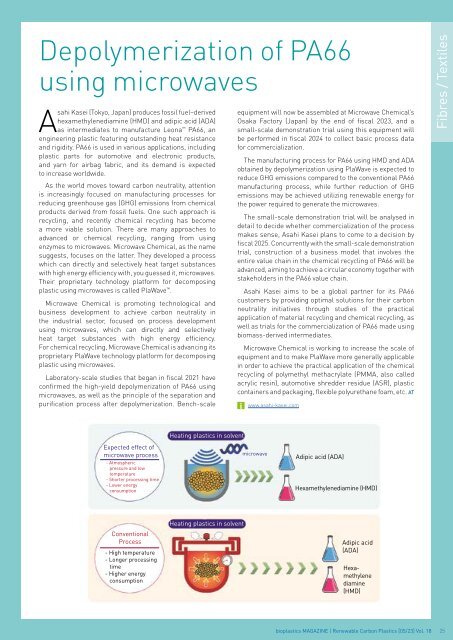Issue 05/2023
Highlights Fibres / Textiles Polyurethane / Elastomers
Highlights
Fibres / Textiles
Polyurethane / Elastomers
You also want an ePaper? Increase the reach of your titles
YUMPU automatically turns print PDFs into web optimized ePapers that Google loves.
Depolymerization of PA66<br />
using microwaves<br />
Asahi Kasei (Tokyo, Japan) produces fossil fuel–derived<br />
hexamethylenediamine (HMD) and adipic acid (ADA)<br />
as intermediates to manufacture Leona PA66, an<br />
engineering plastic featuring outstanding heat resistance<br />
and rigidity. PA66 is used in various applications, including<br />
plastic parts for automotive and electronic products,<br />
and yarn for airbag fabric, and its demand is expected<br />
to increase worldwide.<br />
As the world moves toward carbon neutrality, attention<br />
is increasingly focused on manufacturing processes for<br />
reducing greenhouse gas (GHG) emissions from chemical<br />
products derived from fossil fuels. One such approach is<br />
recycling, and recently chemical recycling has become<br />
a more viable solution. There are many approaches to<br />
advanced or chemical recycling, ranging from using<br />
enzymes to microwaves. Microwave Chemical, as the name<br />
suggests, focuses on the latter. They developed a process<br />
which can directly and selectively heat target substances<br />
with high energy efficiency with, you guessed it, microwaves.<br />
Their proprietary technology platform for decomposing<br />
plastic using microwaves is called PlaWave .<br />
Microwave Chemical is promoting technological and<br />
business development to achieve carbon neutrality in<br />
the industrial sector, focused on process development<br />
using microwaves, which can directly and selectively<br />
heat target substances with high energy efficiency.<br />
For chemical recycling, Microwave Chemical is advancing its<br />
proprietary PlaWave technology platform for decomposing<br />
plastic using microwaves.<br />
Laboratory-scale studies that began in fiscal 2021 have<br />
confirmed the high-yield depolymerization of PA66 using<br />
microwaves, as well as the principle of the separation and<br />
purification process after depolymerization. Bench-scale<br />
equipment will now be assembled at Microwave Chemical’s<br />
Osaka Factory (Japan) by the end of fiscal <strong>2023</strong>, and a<br />
small-scale demonstration trial using this equipment will<br />
be performed in fiscal 2024 to collect basic process data<br />
for commercialization.<br />
The manufacturing process for PA66 using HMD and ADA<br />
obtained by depolymerization using PlaWave is expected to<br />
reduce GHG emissions compared to the conventional PA66<br />
manufacturing process, while further reduction of GHG<br />
emissions may be achieved utilizing renewable energy for<br />
the power required to generate the microwaves.<br />
The small-scale demonstration trial will be analysed in<br />
detail to decide whether commercialization of the process<br />
makes sense, Asahi Kasei plans to come to a decision by<br />
fiscal 2025. Concurrently with the small-scale demonstration<br />
trial, construction of a business model that involves the<br />
entire value chain in the chemical recycling of PA66 will be<br />
advanced, aiming to achieve a circular economy together with<br />
stakeholders in the PA66 value chain.<br />
Asahi Kasei aims to be a global partner for its PA66<br />
customers by providing optimal solutions for their carbon<br />
neutrality initiatives through studies of the practical<br />
application of material recycling and chemical recycling, as<br />
well as trials for the commercialization of PA66 made using<br />
biomass-derived intermediates.<br />
Microwave Chemical is working to increase the scale of<br />
equipment and to make PlaWave more generally applicable<br />
in order to achieve the practical application of the chemical<br />
recycling of polymethyl methacrylate (PMMA, also called<br />
acrylic resin), automotive shredder residue (ASR), plastic<br />
containers and packaging, flexible polyurethane foam, etc. AT<br />
www.asahi-kasei.com<br />
Fibres / Textiles<br />
Expected effect of<br />
microwave process<br />
- Atmospheric<br />
pressure and low<br />
temperature<br />
- Shorter processing time<br />
- Lower energy<br />
consumption<br />
Heating plastics in solvent<br />
microwave<br />
Adipic acid (ADA)<br />
Hexamethylenediamine (HMD)<br />
Conventional<br />
Process<br />
- High temperature<br />
- Longer processing<br />
time<br />
- Higher energy<br />
consumption<br />
Heating plastics in solvent<br />
Adipic acid<br />
(ADA)<br />
Hexamethylene<br />
diamine<br />
(HMD)<br />
bioplastics MAGAZINE | Renewable Carbon Plastics [<strong>05</strong>/23] Vol. 18<br />
25

















